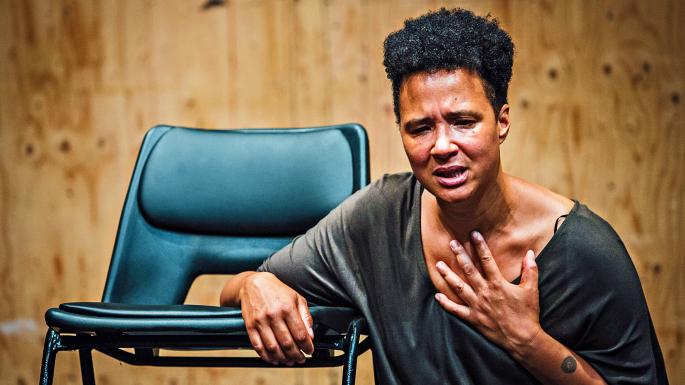Now We Are Here at the Young Vic, SE1
reviewed for The Times, 26th July 2016

Golda Rosheuvel’s performance is devastating
Image credit: Helen Murray
![]()
There’s a lot of refugee theatre about, for obvious reasons. Now We Are Here, a series of autobiographical monologues developed through the Young Vic’s Taking Part project, surprisingly succeeds as therapy for participants and as political storytelling for a British audience.
Yet where projects such as Queens of Syria or Good Chance Calais lament our immediate migrant crisis, Now We Are Here highlights a longer-term problem. Here we don’t meet refugees from recent headlines. Instead, two monologues tell of the dark side to our Commonwealth buddy Jamaica, another of domestic violence in a posh apartment in Pakistan.
Only one of these four monologues seems a conventional refugee story — Michael fled tribal conflict in east Africa to find himself homeless on the streets of London — but here too there are deeper problems. Supported by Micro Rainbow International, the LGBTI charity, Now We Are Here gives voice to a decades-old problem: the vulnerability of gay people seeking asylum.
Performed by professional actors, the first three monologues form an intercut chorus of men’s stories. Beyond the struggles with sexuality and the decision to flee home, we hear of the grinding misery of life on the margins of Britain: the impossibility of routine, the ease of disappearing from the welfare system. Gary Beadle stands out with the charisma he brings to Desmond’s Jamaican story — fair enough, as the cast’s experienced ex-EastEnder — but Manish Gandhi and Jonathan Livingstone also impress.
There’s darkness here, but also hope. It’s less lyrical than Caryl Churchill’s Pigs and Dogs, which explores African sexualities at the Royal Court, but quicker to credit Britain as a haven, not a blight.
The men’s narratives are crafted from refugee workshops, with a fair bit of dramaturgical help from Deanna Rodger, Imogen Brodie and the director, Ian Rickson. They’re followed, however, by an original piece from Tamara McFarlane, a more confident refugee author. Devastatingly performed by Golda Rosheuvel, hers is the story that will haunt you: a tale of first love and first loss, poisoned by fear. Yet all four voices beg to be heard. This is seductive theatre, persuasive protest.






